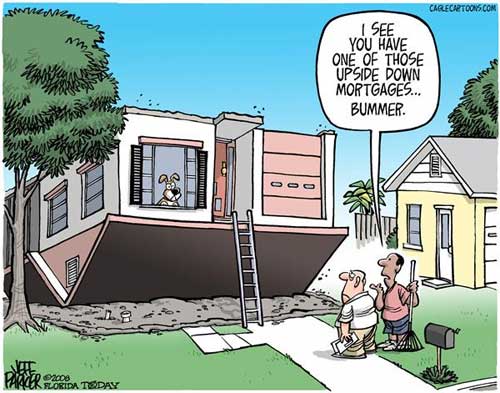 By TOM PURCELL March 08, 2010
I speak of the reversal of fortunes in the housing market. Research firm First American CoreLogic reported last week that 24 percent of all homes with mortgages -- some 11.3 million -- are "underwater," worth less than what their owners owe on them. Home sales are tanking, too. New home sales plummeted unexpectedly in January to their lowest level in 50 years. I witnessed -- and successfully avoided -- the housing bubble firsthand. In 2001, before the 9/11 tragedy, I nearly bought a half-duplex just outside Old Town, Alexandria, Va., for $165,000.  Jeff Parker, Florida Today Distributed to subscribers for publication by Cagle Cartoons, Inc.
I had no idea that just a few years later, interest rates would rocket downward -- that the Federal Reserve would pump an unimaginable amount of dough into the economy to stave off recession. I had no idea that aggressive mortgage firms would use interest-only gimmicks and all kinds of tricks to qualify anyone for a massive loan. Boy, did the easy money cause housing prices to soar. A property nearly identical to the one I almost bought for $165,000 in 2001 sold for $465,000 in 2005 -- an increase of $300,000 in only four years! The Washington Post reported on a new phenomenon that year: housing envy. Suddenly, people who worked side by side, making the same incomes, became envious of those who had bought homes early in the bubble. Suddenly, one person was $300,000 richer -- on paper, anyhow -- than his co-worker who'd bought at the peak of the bubble or was still renting. Pretty soon, all kinds of "smart," educated people were jumping into the housing market. I knew one couple of modest means who borrowed $400,000 to buy a dump of a home in a rough area, convinced they'd make a $100,000 profit in only one year.  Nate Beeler, The Washington Examiner Distributed to subscribers for publication by Cagle Cartoons, Inc. My gut told me the end of the boom was near. I knew this because I'd done some research into the D.C. housing market. Much to my surprise, I discovered a bubble had formed and burst there only one decade before. I spoke with one retired fellow who'd been burned in that 1980s frenzy. He saw the cost of condos soaring at the time. In 1987, he and his wife tapped their life savings to take out mortgages on five units. He paid $115,000 for each -- unaware he'd bought at the bubble's peak. In 1999, years after the bubble had burst, each unit was worth only $90,000. More than a decade after his initial investment, he was underwater by some $125,000 on all five mortgages. I decided to flee the insanity of the D.C. market and head back to Pittsburgh, a much smaller, slower-growing market that was not experiencing an irrational housing boom. I bought a modest condo, my second property here, for less than it was worth. I knew it would make a good rental unit in time. I took on a mortgage I could comfortably pay off in 15 years. A few years later, I rented it out and bought a third property, applying the same strategy.  By Jeff Parker, Florida Today Distributed to subscribers for publication by Cagle Cartoons, Inc.
And I am well-poised now to weather an inflationary cycle that will likely be brought on by out-of-control government spending, as inflation will cause property to "increase" in value, while my mortgages remain fixed. In any event, if my story doesn't frighten you, it should. If I, a lousy English major, anticipated the housing bust well before most experts did, what does that tell you about our experts?
or e-mail him at Purcell@caglecartoons.com E-mail your news, photos & letters to editor@sitnews.us SitNews ©2008 Stories In The News Ketchikan, Alaska |